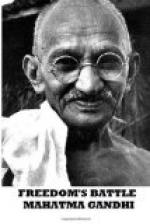I gladly make room for the above letter and respond to the suggestion to give a public reply as no doubt the difficulty experienced by the English friend is experienced by many. Causes are generally lost, not owing to the determined opposition of men who will not see the truth as they want to perpetuate an injustice but because they are able to enlist in their favour the allegiance of those who are anxious to understand a particular cause and take sides after mature judgment. It is only by patient argument with such honest men that one is able to check oneself, correct one’s own errors of judgment and at times to wean them from their error and bring them over to one’s side. This Khilafat question is specially difficult because there are so many side-issues. It is therefore no wonder that many have more or less difficulty in making up their minds. It is further complicated because the painful necessity for some direct action has arisen in connection with it. But whatever the difficulty, I am convinced that there is no question so important as this one if we want harmony and peace in India.
My friend objects to my statement that non-co-operation is not anti-Government, because he considers that refusal to serve it and pay its taxes is actually anti-Government. I respectfully dissent from the view. If a brother has fundamental differences with his brother, and association with the latter involves his partaking of what in his opinion is an injustice. I hold that it is brotherly duty to refrain from serving his brother and sharing his earnings with him. This happens in everyday life. Prahalad did not act against his father, when he declined to associate himself with the latter’s blasphemies. Nor was Jesus anti-Jewish when he declaimed against the Pharisees and the hypocrites, and would have none of them. In such matters, is it not intention that determines the character of a particular act? It is hardly correct as the friend suggests that withdrawal of association under general circumstances would make all government impossible. But it is true that such withdrawal would make all injustice impossible.
My correspondent considers that the Government of India having done all it possibly could, non-co-operation could not be applicable to that Government. In my opinion, whilst it is true that the Government of India has done a great deal, it has not done half as much as it might have done, and might even now do. No Government can absolve itself from further action beyond protesting, when it realises that the people whom it represents feel as keenly as do lakhs of Indian Mussalmans in the Khilafat question. No amount of sympathy with a starving man can possibly avail. He must have bread or he dies, and what is wanted at that critical moment is some exertion to fetch the wherewithal to feed the dying man. The Government of India can to-day heed the agitation and ask, to the point of insistence for full vindication of the




